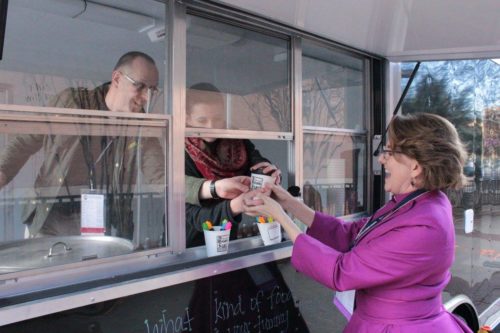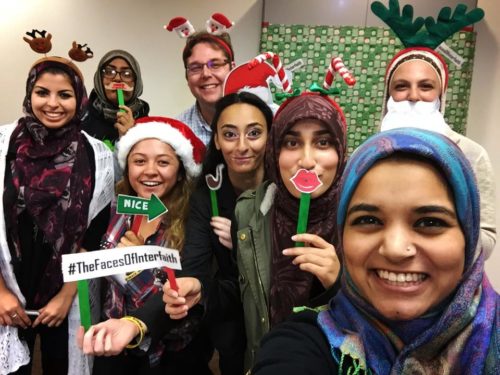Campus ministries changing to serve new students‘Be entrepreneurial,’ church says with grantsPosted Feb 19, 2015 |
|

The side of A Moveable Feast’s mobile kitchen can be written on, allowing students on each campus that the ministry visits in North Carolina to make the trailer their own. Photo: A Moveable Feast via Facebook
[Episcopal News Service] The way students earn university degrees in the United States is changing and Episcopal Church campus ministries are responding creatively.
Examples of that innovation, supported by grants from the Domestic and Foreign Missionary Society, include an interfaith ministry at a state commuter college, a combination food truck and chapel that will visit campuses in North Carolina and a North Dakota effort to provide holistic help to Native American students. (The Domestic and Foreign Missionary Society is the legal and canonical name under which The Episcopal Church is incorporated, conducts business, and carries out mission.)
“The Episcopal Church’s priorities in campus ministry are following where more students are enrolling these days,” said the Rev. Mike Angell, Episcopal Church missioner for young adult and campus ministries.
“Higher education for a lot of students does not look like a four-year college, so we’re trying to get the church to be creative in how they engage campus ministry, to be entrepreneurial. These grants provide seed money to start new projects, new ways of ministering to young adults in higher education: some of whom aren’t full-time students, some of whom are exploring what their educational career will look like.”
Campus ministry in North Dakota
For instance, the Diocese of North Dakota is using a $25,000 Leadership Grant awarded by the Domestic and Foreign Missionary Society to establish what the Rev. Canon John Floberg calls a holistic ministry to the native students attending Sitting Bull College in Fort Yates on the Standing Rock Indian Reservation and United Tribes Technical College in Bismarck.
Floberg is a member of The Episcopal Church’s Executive Council.
While spirituality is fundamental to campus ministry “it’s not going to be the only thing that helps a student get through college but it can be one of the things that helps them get through college,” Floberg said, especially among native students who sometimes need more than the usual encouragement and practical help to remain in school. That help can be as basic as finding travel money for a student to return to school after traveling home for a family emergency, he said.

Sitting Bull College in Fort Yates, North Dakota, on the Standing Rock Indian Reservation, is one of the places where the Domestic and Foreign Missionary Society is supporting people who are thinking creatively about campus ministry. Photo: Sitting Bull College
The planned ministry would not be a one-way street. The Witayas (“gathered groups” in Sioux) that Floberg hopes to form will use a model of peer support based on the “Sources of Strength” suicide-prevention techniques that were developed in North Dakota. The model would be used for students’ “mutual support in making it through college, getting their degree and doing it with the hope and perseverance that are part of the Christian faith,” Floberg wrote in the November issue of the diocesan newspaper.
Floberg, who as a canon missioner is responsible for five congregations spread over 300 miles in North Dakota, both on and off reservations, said the church often has relationships with native students formed when they were in youth groups. Following those students as they transition into college is a “logical next step,” but that step has not always been taken. Both Sitting Bull and United Tribes are “filled with people that you already know and they’re in a transition in life that the church hasn’t paid much attention to,” he said.
An added goal of the budding program is to support educational and tribal efforts to help students discern how they might contribute to their communities by using their degree to benefit the tribe, said Floberg, who noted that he was speaking to Episcopal News Service on the 124th anniversary of the death (Dec. 15, 1890) of Sitting Bull, the Sioux chief and holy man who said “Let us put our minds together and see what life we can make for our children.” Floberg added that mentors could also discuss students’ future ministry, lay or ordained.
Those are the long-range goals. In the meantime, Floberg offers what might be called the practical basis of much of campus ministry: free food. At Sitting Bull, he provides lunches in the atrium of the sciences building and the program has purchased a mobile grill and smoker for preparing barbecue. The meals are a way to make the church’s presence known and share information about plans for the ministry.
On the move in North Carolina
Food was the genesis of A Moveable Feast, a Diocese of North Carolina campus ministry based out of a custom trailer fitted with a kitchen and a prayer space.
The idea came to North Carolina Bishop Suffragan Anne Hodges-Copple during her pre-election tour of the diocese. “I just kept talking about the need for us as a diocese not to find gimmicks but to try to be more creative and entrepreneurial in our efforts to give ancient traditions fresh expression in unexpected and yet engaging places,” she told ENS.
Hodges-Copple, formerly the Episcopal chaplain at Duke University, said she began to put her desire to minister on “historically ignored and underserved campuses – especially community colleges” together with the ubiquity of food trucks in Durham, North Carolina. When she bounced the idea off the Rev. Nils Chittenden, who at that time was the diocesan minister for youth and the Episcopal chaplain at Duke, he immediately said, “Yes!”
A Moveable Feast Coordinator Caitlyn Darnell put it this way: “I was absolutely fascinated by the thing.”

The Rev. Nils Chittenden, who at that time was the diocesan minister for youth and the Episcopal chaplain at Duke University, and A Moveable Feast Coordinator Caitlyn Darnell serve hot cider to North Carolina Bishop Suffragan Anne Hodges-Copple during diocesan convention in late November where the mobile campus ministry made its debut. Photo: Diocese of North Carolina via Facebook
It took a long time for Chittenden, Darnell and Hodges-Copple to figure out how to put the idea into practice, and they were cautious about the ministry’s eventual face and image.
“There have been a lot of church ventures and start-ups that have tried to do really cool things for the sake of doing a really cool thing, and somebody in their late teens or early twenties looks at it and goes ‘that was pretty dumb,’ ” said Darnell.
Darnell works half time for the diocese in her Moveable Feast role and is in the second year of a placement through the Episcopal Service Corps, a partner of the Domestic and Foreign Missionary Society, with The Abraham Project. She works at St. Timothy’s Episcopal Church in Winston-Salem as the formation assistant. The Rev. Stephanie Yancy was appointed diocesan interim missioner for young adult ministry in mid-January, succeeding Chittenden who will become rector of St Stephen’s Episcopal Church in Armonk, New York, in late January. Yancy will direct A Moveable Feast.
Although the idea for what became A Moveable Feast began as food truck, Darnell said the group also considered using a bus or a recreational vehicle. Darnell doesn’t remember quite when and how the idea of a custom trailer occurred to her, but now A Moveable Feast moves in a 28-foot specially rigged trailer. There’s room for a small space in the front for individual prayer or conversation with a chaplain, and there’s a kitchen in the back. Remembering her college years at the College of William and Mary, Darnell said, “having the chapel was a really, really important part of what we are doing” because college life can be chaotic and even extroverted students sometimes feel “overstimulated and inundated with things” and in need of a quiet space.
Food can be served from a window in the side of the trailer or out the back, which folds down into a stage that can be covered by a tent, Darnell said. An altar for that stage will eventually be commissioned, Darnell said, and food will be served from the altar “so you also get that really cool theology of the Eucharistic supper.”
Because the ministry is meant to move among campuses, even the color of the trailer was tricky. The trailer could not feature one school’s team colors over another. During a June meeting at St. Philip’s Episcopal Church in Durham of local church and campus people who were asked for their ideas about the ministry, the idea arose of having the trailer be a “community chalkboard.” The trailer is black and people at each campus will be invited to write on its sides, making it their own each time it visits.
A Moveable Feast hopes to partner with local churches or other local groups who would help in food preparation and serving, and who would be willing to learn how to minister to young adults, Darnell said. They will need to be open to knowing what to expect from this sort of ministry and how it will change your parish experience, she added.
The wheels are turning, Darnell said, to establish a presence at Johnson Community College in Smithfield, North Carolina Central University in Durham and Johnson C. Smith College in Charlotte. While Barton College in Wilson is also on their list, those conversations have not yet started, she said. A Moveable Feast hopes to be at Durham Technical Community College this year as well, she added.
A Moveable Feast has also helped form community of three young adults, known as companions, who will travel with the truck to be peer mentors/ministers.
All of those aspects of A Moveable Feast are connected, Hodges-Copple said, to the story of the risen Jesus on the road to Emmaus on the evening of the first Easter. The ministry hopes to “bring the companionship of Jesus Christ alongside many people, providing a transformative encounter with God in a surprising, somewhat non-traditional context,” according to its website.
The ministry received a two-year, $30,000 Leadership Grant from the Domestic and Foreign Missionary Society in November 2013.
Meanwhile, in Southern California
On the other side of the country, food is not the basis for the Rev. Sean Lanigan’s ministry at California State University Long Beach although “I tried first to build a conventional Bible study and pizza campus ministry,” he said of his arrival two years ago.
It didn’t seem to work at the 40,000-student commuter campus, so he set about learning what would. He quickly discovered “what did seem to work was getting excited about interfaith.”
And activism. The ministry quickly became known as the “Interfaith Project” and has since developed a core group of about a dozen predominantly Muslim and Jewish students who have tackled such issues as women’s empowerment and faith and climate.
“It has become a growing, emerging gathering of students interested in building relationships across boundaries … [and] learning how to live in a world of difference,” said Lanigan.

Some members of the Interfaith Project campus ministry at the California State University Long Beach join the Rev. Sean Lanigan to celebrate the recent holiday season.
That interest makes it different to most other campus groups, he said. “Cal State Long Beach is incredibly diverse and incredibly stratified, but there are not a lot of groups on campus that transcend boundaries.”
The ministry is a joint effort of the Domestic and Foreign Missionary Society and the Evangelical Lutheran Church in America, said Lanigan, an Episcopal priest in the Diocese of Los Angeles. Lanigan and the ministry are based at Our Saviour’s Lutheran Church in Long Beach. The Episcopal Diocese of Los Angeles, the ELCA and its Southern California Synod provide ongoing financial support, he said. A board of Episcopalians and Lutherans, both clergy and laity, developed the partnership and continues to guide the development of the campus ministry and a new worshiping community called Holy Grounds.
A recent $5,000 Domestic and Foreign Missionary Society grant will help fund continuation of the ministry, including supporting the presence of Dominique Bocanegra, a part-time Episcopal Urban Intern who assists as an organizer and mission developer, Lanigan said.
Until she began serving with the Interfaith Project in August, Bocanegra, 23, didn’t “realize how interconnected faith really is and how it relates to what’s happening in the United States and across the globe.”
The Interfaith Project addresses the core of many issues, she added: “There’s so much tension – to me, it’s because of a lack of dialogue, a lack of relationships.”
She hopes to help focus students’ efforts on issues of justice because “not every homeless person is Christian; not everyone suffering from drought is Muslim. We don’t have to sit here and say, ‘you need to become my religion,’ but, through my experience and my eyes you can hear how we view the drought: This is how we see our brothers and sisters on the street.”
Aliyah Shaikh, 19, an international studies student focusing on the Middle East and North Africa, said the Interfaith Project gives her a space to make friendships with people of different backgrounds.
“The Interfaith Project seems to be the only group of students that meets in that sort of capacity,” said Shaikh, a member of the Muslim Student Association board.
She estimated that about 70 to 80 percent of the core group is young Muslim women. The remaining 20 to 30 percent are usually students from Beach Hillel, the Jewish student organization, and one regular attendee was Buddhist.
“We’ve had challenges getting more Christian attendees, and we’re trying to think of ways to reach out to each other,” she said.
Lanigan agreed. “We’re trying to build as many collaborations on campus as possible,” he said. “We’re trying to be interested in what’s going on, on campus and much more broadly, and how religion can be part of that. We’re not sitting around philosophizing about God, although that can be a part of it, sometimes. Mainly, we’re talking about how we as humans share this work together.”
A budget based on mission
The 2013-2015 budget passed by General Convention allotted $300,000 in campus ministry grants (Line 67 here). Those grants are part of the ways in which the Domestic and Foreign Missionary Society is responding to the second Mark of Mission which calls on members of the Anglican Communion to teach, baptize and nurture new believers. Specifically, the grants are meant to establish or revitalize campus ministries and imagine new ways to reach young adults who traditionally are the least likely to seek out a campus ministry.
In its recent Report to the Church the Domestic and Foreign Missionary Society noted that it has awarded $204,348 thus far.
General Convention also specifically called for two new campus ministries to be established at community colleges, tribal colleges or other two-year institutions of higher education in each of the church’s nine provinces of the Episcopal Church. Resolution C069 also called for training for local campus ministry leaders.
The resolution, sponsored by Province VI, noted “the increasing importance of community colleges as critical places for evangelism and Christian formation, particularly among racially, ethnically, and socioeconomically diverse populations.”
Angell told ENS that “the opportunity is really high because ‘community college’ is almost a contradiction in terms or a misnomer because in so many community colleges there’s no community at all.”
“So what does it look like to build community in a situation where you’re not competing with a hundred thousand other clubs and fraternities and sororities?” he asked. “You’ve got students to whom the presence means a lot and the chance to have community in the midst of a non-traditional education situation is really high.”
Angell also noted that community colleges are becoming the higher-education entry point for students of immigrant communities. Those students are often the first in their families to go to college and they need strong support, he added.
“We’re not just supporting non-traditional Episcopal students; we’re trying to support non-traditional college students,” Angell said.
Convention structured the current triennial budget around the Communion’s Five Marks of Mission and provided significant unallocated sums for new work targeted around each Mark of Mission. The intention was that the resulting work would be done in new, collaborative partnerships with dioceses and congregations. The Domestic and Foreign Missionary Society has provided seed money and/or matching grants as well as staff support and expertise for the new work.
— The Rev. Mary Frances Schjonberg is an editor/reporter of the Episcopal News Service. The Rev. Pat McCaughan is a correspondent for the Episcopal News Service.

Social Menu